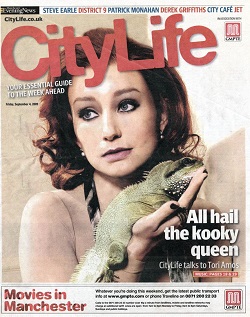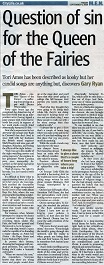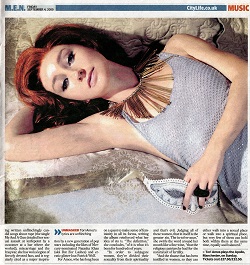|

songs | interviews | photos | tours | boots | press releases | timeline | stories
CityLife (Manchester, England)
September 4, 2009
All hail the kooky queen
CityLife talks to Tori Amos

Question of sin for the Queen of the Fairies
Tori Amos has been described as kooky but her candid songs are anything but, discovers Gary Ryan.
Tori Amos -- one-time "Queen of the Fairies" -- is suffering from jet lag on a par with Doctor Who's today.
Forty eight hours ago she completed the American leg of her first world tour as an independent artist (having signed a joint venture deal with Universal records last year), in support of her tenth studio record, titled Abnormally Attracted to Sin.
Now she's sequestered in her 300-year-old cottage near Bude in Cornwall that she's lived in since 1998 with her husband, British sound engineer Mark Hawley and nine-year-old daughter, Natashya, and feeling the effects of the night before.
"Tash was up in the middle of the night watching movies and eating popcorn," she explains in her gossamer North Carolina purr, once memorably described as the aural equivalent of singing into a hot bath.
"And of course, I'm right by her side. You don't need to twist my arm."
It's difficult to know what to expect from Amos, 46. Early on in her career, she was regularly ascribed the description "kooky", an image encapsulated by the cover of her 1996 album Boys For Pele, where she was photographed suckling a piglet.
Yet behind the convincing world of exotic eccentricity, she's conjured up lurks a steely determination and business acumen that would make Alan Sugar proud.
For instance, when Atlantic attempted to impose its choice producer midway through recording 1994's Under The Pink, she held her ground and threatened to burn the tapes.
Not only that, would a space cadet be capable of co-founding a major charity, as Amos has (RAINN -- the Rape, Abuse and Incest National Network)?
In person she's intense, choosing her languige with surgical precision. You can't help feeling she'd make a fantastic cult leader.
"When we started the tour," she remembers, "everyone knows that these are trying times and people would show up at the stage door and you'd learn that they aren't going to college this fall because their parents, you know, lost their jobs.
"And what they thought they were going to be doing their whole life, they're not doing. And you're hearing these stories and you think, "Okay, I want these people to walk out with a lot more energy than they walked in with."
"I always like to give a show that's a couple of hours long where you take a trip and by the end of it you feel walking out of that place that you can pretty much do anything."
While the credit crunch may have thrown the issue into sharper focus, Tori Amos has always been an artist who has offered considerable value for money.
Previous albums have housed concepts of sphinx-like complexity.
On Strange Little Girls she provided a fascinating slant on the traditional covers album, by taking songs written by men about women (Eminem, Neil Young), reinterpreted by a woman.
On her last full-length effort, American Doll Posse, she had five personalities, each representing various aspects of modern woman as a whole.
On its opening salvo, Yo George, she attacked the policies of the Bush administration ("Cause I have now an allergy to your policies it seems"), so how does she feel now Barack Obama has become the 44th president of the United States?
"Of course there's a new optimism," she notes. "Even though the world is going through this upheaval, and the reality is when people are losing their jobs and their homes, it's hard to sometimes look beyond your own crisis.
"And I think travelling across the country, you begin to see the depth of the crisis and yet because there is somebody I think that is respected in power, it's a different world than it would be if Obama weren't there."
Abnormally Attracted To Sin, which cribs its title from a line out of Guys And Dolls, arose out of Amos questioning how you define power.
Born to a Methodist minister father and a mother of Cherokee descent, she was brought up marinated in Biblical imagery and witnessed irst-hand the controlling effect organised religion has on women's lives.
"It was instilled in me that there was sin and there is a consequence for sin, if you lead a sinful life," she recalls. "But the question for me was: define a sinful life. Because this definition has been made by, you know, men that have abused their authority and wanted to subjugate the masses. So they shouldn't be allowed to define sin."
At four years old she had been singing in front of her father's congregation. When she won a scholarship to the prestigious PEabody Conservatory at the age of five he hoped she would become a composer of religious songs -- but she had already started to question the beliefs that had been drummed into her.
"My grandmother, who was a missionary teacher, my father's mother, told me: 'When you grow up you need to give your body to a man and our soul to God'. And I remember saying, 'And What do I get?'."
Religion is a long-standing lyrical theme for Amos, dating right back to her critically-acclaimed debut album, 1992's Little Earthquakes. She believes the power of the Church is insidious and feels that, instead of urging people to follow the compassionate path of Christ, it excels in promoting physical and mental bondage.
"My father always says this quote, 'If I had been a dentist, what in the world would you have done?'," she says. "And I will say that doesn't excuse all of the controlling behavious."
Having written unflinchingly candid songs about rape (the single Me And a Gun detailed her sexual assault at knifepoint by a customer at a bar where she worked), miscarriage and the Iraq war, she has won a legion of fiercely devoted fans, and is regularly cited as a major inspiration by a new generation of pop stars including the likes of Mercury-nominated Natasha Khan (aka Bat for Lashes) and erratic glitter-lout Patrick Wolf.
For Amos, who has long been on a quest to make sense of femininity in all its forms, writing the album reinforced what her idea of sin is. "The definition," she concludes, "of it is what it's been for hundreds of years.
"In order to subjugate women, they've divided their sexuality from their spirituality and that's evil. Judging all of these women, that in itself is the greater sin. The intolerance that the religious patriarchy had for the natural act of fertility.
"And the shame that has been instilled in women, so they can either walk into a sexual place or walk into a spiritual place, but very few of them can hold both within them at the same time, equally and balanced."
Tori Amos plays the Apollo, Manchester, on Sunday.
Tickets cost £27.50/£32.50.
original article
 
t o r i p h o r i a
tori amos digital archive
yessaid.com
|